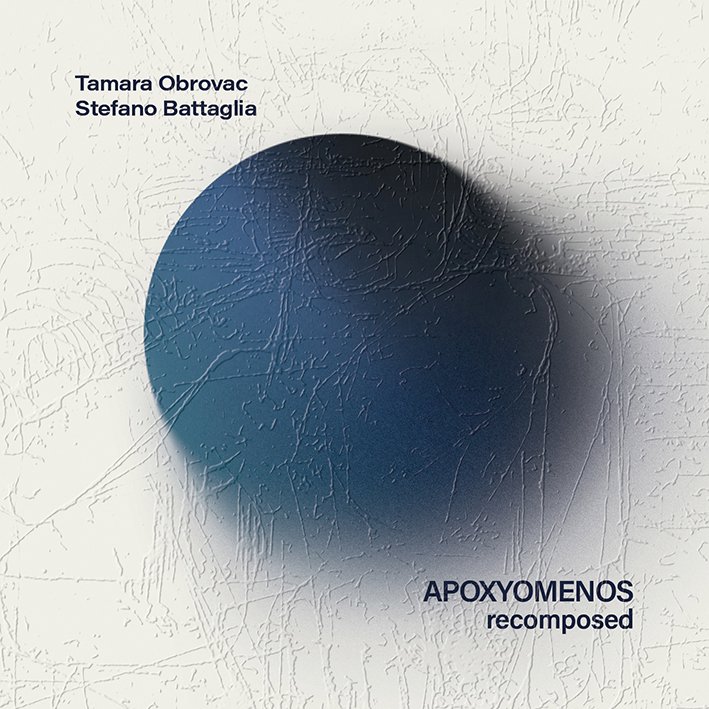
Buy album:
Cantus web shop
Physical:
Klub & Knjižara, Giardini 2, Pula
Listen:
Digitalne platforme
Watch:
Apoxyomenos recomposed
Tamara Obrovac / Stefano Battaglia
Cantus / Croatian Composers Society / 2024
Formati: CD, Digital
Tamara Obrovac, voice
Stefano Battaglia, piano
All songs written by: Tamara Obrovac
The fragments of the verses from the Trojan Women by Euripides chosen by: Lada Kaštelan
Recorded at: Accademia Musicale Chigiana, Siena, Italy
Sound engineer: Mattia Cella
Miks: Igor Ilić
Mastering: Janez Križaj
Music producers: Tamara Obrovac & Igor Ilić
Design: Studio Sonda
Fragment of the painting on the cover: Ivan Obrovac.
The music project Apoxyomenos recomposed is based on the pieces which Tamara Obrovac composed for the Croatian National Theatre in Zagreb's ballet Apoksiomen in 2017.
Stefano Battaglia reharmonised Tamara's compositions which acquired their final form during their team work in Siena, at the Accademia Musicale Chigiana in the autumn of 2022 and 2023, when they were also recorded.
The tragedy the Trojan Women which, with its theme of war and exile, unfortunately also corresponds to the modern times, evokes emotions such as sorrow, hopelessness, grief, abandonment, hope, nostalgia, resignation, unrest and revolt.
The artistic vision of the Project rests on Apoxyomenos (a young athlete's bronze statue, found in the sea near Mali Lošinj after 2,000 years) as a witness of a vanished civilisation, a symbol of a sunken world, an extinct language, a shipwreck and the metaphysics of the sea as a tomb, but at the same time also a source and continuation of life.
The melodiousness, but also the austerity of the Ancient Greek, have provided a new dimension to the creative work of this tandem, whose filigree interpretations opened a new spectrum of expression and also inspired a transformation of compositions into a different musical form, which also brings the classical music elements into their signature, characterised by a combination of contemporary jazz and improvised music.
___________________
Fragments in the sea
A fragment. A part of a larger whole, from which it is broken off, detached or shattered. The texts of the songs are woven out of fragments of the Euripides' Trojan Women, which themselves contain the whole from which they are separated and which, together, make a new whole. Sometimes it is a verse, a part of a verse, a word or a call, sometimes several verses in a row. They are separated from the situations and characters they belong to.
Their resonating and meaning are transferred to a new context, to Tamara Obrovac's songs.
Sometimes lyrics called out for songs, sometimes songs called out for lyrics; in both cases, deep recognition and turning into energy and emotion occured, which then, like currents and waves, plunged into the sea of Stefano Battaglia's piano variations.
Fragmenting is a method used to create lyrics, but also their theme. The fragments of wrecked lives. Lives which, forever distroyed, cannot be resurrected again as did a bronze statue of a young athlete, after two thousand years under the sea. He only lost the strigil, with which grime from the body is removed after exercising.
An accident threw him into the sea, a storm the ship found itself in while on its way towards the Adriatic coast, a storm which, although already then precious, made him an excessive load, thrown from the deck. What did he witness in the depths of the sea, where time does not exist, where everything that has ever sank is depositing and echoing, what stories did he hear?
The sea is a mental and poetic space of these songs, a boundary between the world of living and the dead, real and imaginary. From there, Apoxyomenos emerged; from there emerges also a mythological story about the siege and destruction of Troy in which, over and over again, the present is reflected.
In these nine songs of Tamara Obrovac, the myth and the present resound together.
Lada Kaštelan
